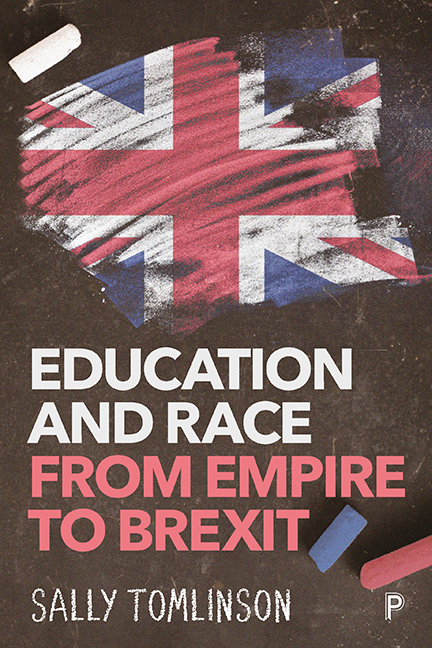Book contents
- Frontmatter
- Contents
- Acknowledgements
- List of abbreviations
- Introduction
- 1 Empire and ethnocentric education
- 2 Internal colonialism and its effects
- 3 Ending empire: Education for ignorance, 1945-1960s
- 4 Post-imperial anxieties and conflicts, 1970-90
- 5 Inequalities, a European Union and education markets, 1990-97
- 6 New Labour: Wars, race and education, 1997-2005
- 7 Not so New Labour: Race and education, 2005-10
- 8 A divided society: Race, class and education, 2010-16
- 9 A dog’s breakfast Brexit, 2016-18
- References
- Index
4 - Post-imperial anxieties and conflicts, 1970-90
Published online by Cambridge University Press: 27 April 2022
- Frontmatter
- Contents
- Acknowledgements
- List of abbreviations
- Introduction
- 1 Empire and ethnocentric education
- 2 Internal colonialism and its effects
- 3 Ending empire: Education for ignorance, 1945-1960s
- 4 Post-imperial anxieties and conflicts, 1970-90
- 5 Inequalities, a European Union and education markets, 1990-97
- 6 New Labour: Wars, race and education, 1997-2005
- 7 Not so New Labour: Race and education, 2005-10
- 8 A divided society: Race, class and education, 2010-16
- 9 A dog’s breakfast Brexit, 2016-18
- References
- Index
Summary
We all thought the empire was a marvellous thing. It was a force for good throughout the world. When Britain chose to give her empire away we were rather saddened – the colonial people had all the blessing of colonial rule and look how casually they dismissed them. (National Service cadet officer, quoted in Shindler, 2012: 92)
If we went on as we are, by the end of the century there would be four million people of the New Commonwealth or Pakistan here. Now that is an awful lot and I think it means people are rather afraid this country might be swamped by people with a different culture. (Thatcher, 1978)
An empire mindset never really died. For some, colonial rule was a blessing given up by ungrateful people, and for many, including a prime minister, the arrival of former colonial subjects into the colonising country was regretted. By 1978, some politicians claimed that just 1.5 million black and Asian people, a third actually born in Britain, might swamp the other 55 million. National servicemen who had served overseas were, as Colin Shindler has noted, among many who regretted the ending of the British Empire. From the 1970s all political parties were in agreement that immigration from the former colonies, euphemistically termed ‘New Commonwealth’ countries, should be limited. Whereas in the 19th and earlier 20th centuries politicians, adventurers, academics and others were openly racist over colonial conquests of supposedly inferior peoples, by the mid-century, an ideology of conservative imperialism had developed to try to smooth moral dilemmas. Civis Britannicus sum (‘I am a British citizen’) and accompanying legal rights was a claim all people in the Empire could make, but it assumed colonial people would stay put in their countries. Conservative imperialism, liberal ideologies concerned with human rights and socialist notions of the brotherhood of all workers disappeared with the invited arrival of colonial workers and their families. By the 1970s notions that might earlier have been dismissed as morally unacceptable became the unspoken assumptions of all political parties.
This chapter documents the continuation of an anti-immigrant ideology and its linkage with the idea of an exclusive British identity, and the developing reactions of a younger generation becoming more race conscious.
- Type
- Chapter
- Information
- Education and Race from Empire to Brexit , pp. 89 - 114Publisher: Bristol University PressPrint publication year: 2019



